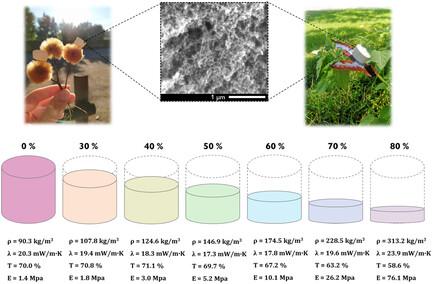Towards the Optimization of Polyurethane Aerogel Properties by Densification: Exploring the Structure–Properties Relationship
引用次数: 0
Abstract
The aerogel performance for industrial uses can be tailored using several chemical and physical strategies. The effects of a controlled densification on polyurethane aerogels are herein studied by analyzing their textural, mechanical, sound, optical, and thermal insulating properties. The produced aerogels are uniaxially compressed to different strains (30%–80%) analyzing the consequent changes in the structures and, therefore, final properties. As expected, their mechanical stiffness can be significantly increased by compression (until 55-fold higher elastic modulus for 80%-strain), while the light transmittance does not noticeably worsen until it is compressed more than 60%. Additionally, the modifications produced in the heat transfer contributions are analyzed, obtaining the optimum balance between density increase and pore size reduction. The minimum thermal conductivity (14.5%-reduction) is obtained by compressing the aerogel to 50%-strain, where the increment in the solid conduction is surpassed by the reduction of the radiative and gas contributions. This strategy avoids tedious chemical modifications in the synthesis procedure to control the final structure of the aerogels, leading to the possibility of carefully adapting their structure and properties through a simple method such as densification. Thus, it allows to obtain aerogels for current and on-demand applications, which is one of the main challenges in the field.

通过致密化优化聚氨酯气凝胶性能:探索结构与性能的关系
气凝胶的工业用途性能可以通过几种化学和物理策略来定制。本文通过分析聚氨酯气凝胶的纹理、机械、声音、光学和隔热性能,研究了受控致密化对聚氨酯气凝胶的影响。将生产出的气凝胶单轴压缩至不同的应变(30%-80%),分析其结构随之发生的变化,进而分析其最终特性。不出所料,气凝胶的机械刚度会因压缩而显著增加(在 80% 应变时弹性模量会增加 55 倍),而透光率在压缩 60% 以上时才会明显降低。此外,还分析了热传导贡献所产生的变化,在密度增加和孔径减小之间取得了最佳平衡。将气凝胶压缩到 50%应变时,热传导率最小(降低 14.5%),其中固体传导的增加超过了辐射和气体传导的减少。这种策略避免了在合成过程中为控制气凝胶的最终结构而进行繁琐的化学修饰,从而有可能通过致密化等简单方法仔细调整气凝胶的结构和性能。因此,它可以获得适合当前和按需应用的气凝胶,而这正是该领域的主要挑战之一。
本文章由计算机程序翻译,如有差异,请以英文原文为准。
求助全文
约1分钟内获得全文
求助全文

 求助内容:
求助内容: 应助结果提醒方式:
应助结果提醒方式:


